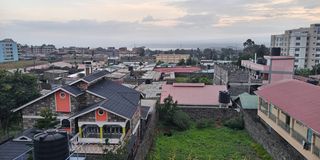Loud Nakuru churches torment residents, as politicians muddy the issue

Eastmore estate in Nakuru city where churches have been a nuisance to residents because of noise pollution.
Churches within residential areas are now turning into a thorn in the flesh of the residents from loud sound emanating from their premises.
For residents in Eastmore, churches have been a source of uncomfortable living conditions from Friday evenings all through to Sunday.
Martha Gicheha , whose apartment is next to a church, says that the music and instrument vibration is at times unbearable, especially on Friday evenings when the church is conducting their evening services (Kesha).
“It starts with them fine tuning their instruments, then loud piano keys, followed by the ‘mic test one, two,’ said by those in the church. The situation gets intolerable when the praise and worship session starts. This gives us sleepless nights and one can only get some rest when the Kesha comes to an end,” she laments.
Another resident, Margaret Maina from Kiamunyi, notes that churches conducting morning devotions should consider lowering the sound coming from the churches in the morning.
While admitting she admires the work done in the church, she notes that the church next to her home is an issue of concern to her, since their services start very early.
“The first service starts at 6.30 am and the instrument's sound is ear piercing. More to it, this is not limited to weekends alone but weekdays also. This denies me the peace and quiet I expect to enjoy from my home,” she says, as she call upon the necessary authorities to check on the loud sound originating from churches
While acknowledging she is a Christian, Mercy Koskei, a resident in Kiratina, says living near a church for the past one year has been hectic for her, as sometimes she wants a restful weekend after a rough week but the loud music from the church does not give her the chance to relax.
She says some services and events that occur early in the morning or late at night interrupt her sleep, as loudspeakers amplify sermons and hymns, often carrying sound beyond church walls.
"Nema (National Environment Management Authority) should implement measures to reduce noise, such as soundproofing of buildings or limiting the volume of announcements and music especially during odd hours. I have been contemplating on moving out but finding another apartment has been hard for me," she says.
Speaking on the Matter, County’s Environment Chief Officer, Kennedy Mungai, acknowledges that noise pollution from churches has been challenging to handle, further mentioning that the matter has been politicized, making it hard to implement the necessary regulations.

Nakuru Environment Chief Officer Ken Mungai.
“As regulators, we use noise level meters to inspect whether churches are engaging a reasonable amount of sound while operating. However, some politicians have been quick to come in the defence of these churches ones we take action, seeking political mileage with the matter,” he reveals.
He explains that, for a place of worship, the maximum permissible noise levels allowed is 40 decibels in a 30-meter radius from residential areas.
Mr Mungai says, in their effort to regulate noise pollution it’s been challenging to authenticate the reports they receive between individuals who say it is noise and persons who are just against religion.
“At times you receive complaints and by the time you get there it is a false alarm or the noise is within the required parameter,” he says as he explains how the matter being a social issue is quite challenging to regulate.
Asked how the matter can be resolved, Mungai says it starts by residents reporting, prompting the environment department to inspect the church in question.
This he says can be done at the county’s department of environment or an official complaint directed to NEMA.
“Solving the root cause of the issue may take some time because no law prohibits churches from being built in residential areas. Physical planning permits are issued if someone wants to build a church. At the moment, it lies with residents declining and writing to protest if they see a church building coming up in the estate and they are not comfortable with it and reporting the matter in instances the church is already operational,” he concludes.

